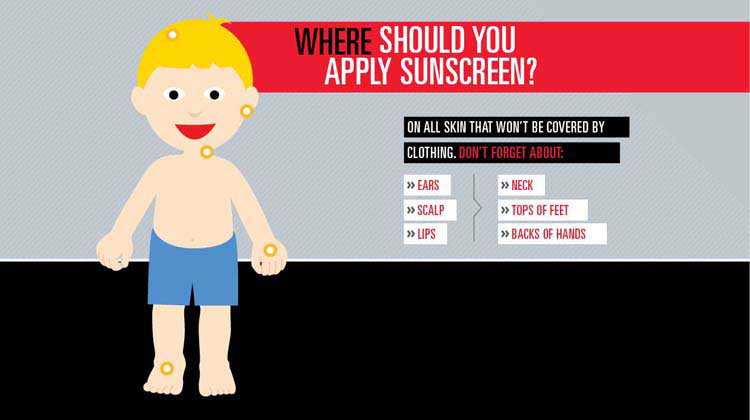Why is sunscreen important?
The who, what, when, where and why of using sunscreen.
Who should use sunscreen?
Everyone except infants younger than six months should use sunscreen, according to the American Academy of Dermatology.
What should you look for in sunscreen?
The American Academy of Dermatology recommends sunscreen that has:
- Broad-spectrum protection, which shields UVA and UVB rays.
- UVA rays cause lasting skin damage, contribute to skin aging.
- UVB rays cause sunburns and skin damage.
- Sun protection factor (SPF) of 30 or higher. Higher SPF equals more protection, but no sunscreen blocks 100% of UV rays.
- Water-resistance to withstand water sports and sweating
- Water resistant: effective up to 40 minutes in water.
- Very water resistant: effective up to 80 minutes in water.
- No sunscreen is completely waterproof.
Avoid combination products, such as moisturizer with SPF or sunscreen with insect repellent, as sunscreen needs to constantly be reapplied, while other products do not.
Toss your sunscreen if:
- It's more than three years old
- The expiration date has passed
- The color or consistency has changed
- The container has been exposed to high temperatures
When should you wear sunscreen?
Any time you're exposed to the sun, wear sunscreen. Sun protection isn't just for summer, either:
- Snow, sand and water reflect harmful UV rays
- 80% of UV rays reach your skin on cloudy days
When should sunscreen be applied?
- Put it on 15 to 20 minutes before sun exposure
- Two hours after every application, swimming or sweating
Applying sunscreen?
Where to apply sunscreen is easy to remember — on all skin that is not covered by clothing. Don't forget about:
- ears
- scalp
- lips
- neck
- tops of feet
- backs of hands
Use at least one ounce, about the size of a quarter, to cover exposed areas.
Different types of sunscreen work better on different areas:
- Face — cream sunscreen
- Scalp — gel sunscreen
- Around your eyes — stick sunscreen
- Body — lotion or spray sunscreen
Benefits of sunscreen: Why to use it
To avoid painful sunburns and lasting skin damage, which can lead to skin cancer. It only takes 15 minutes for the sun to begin damaging your skin.





